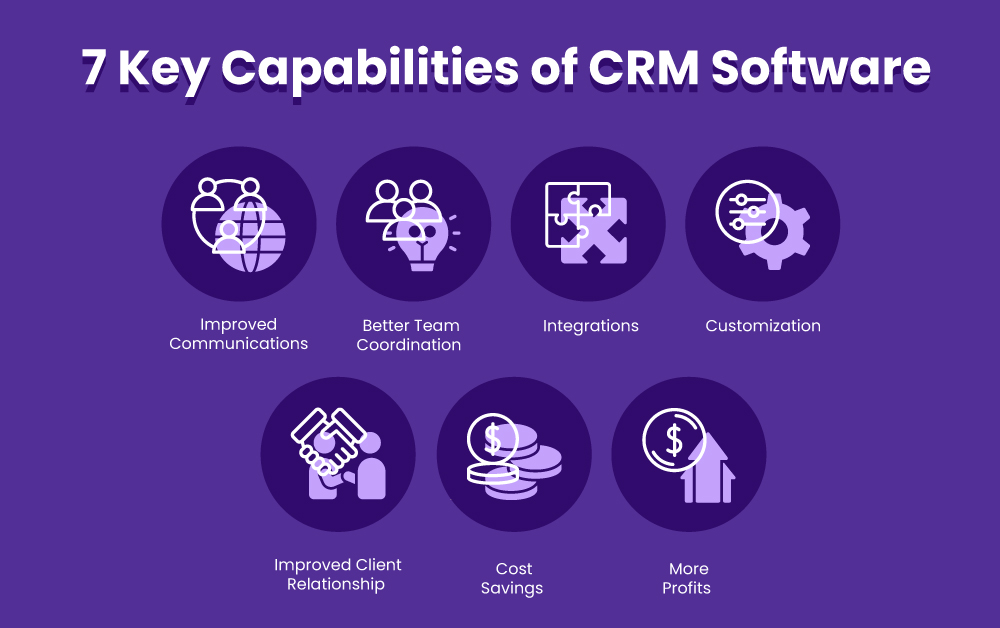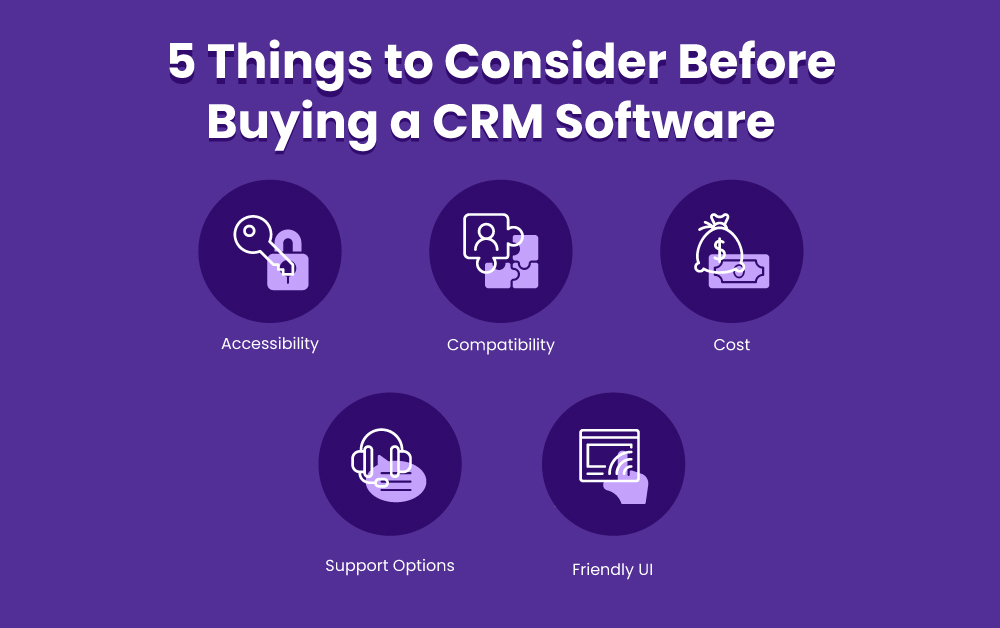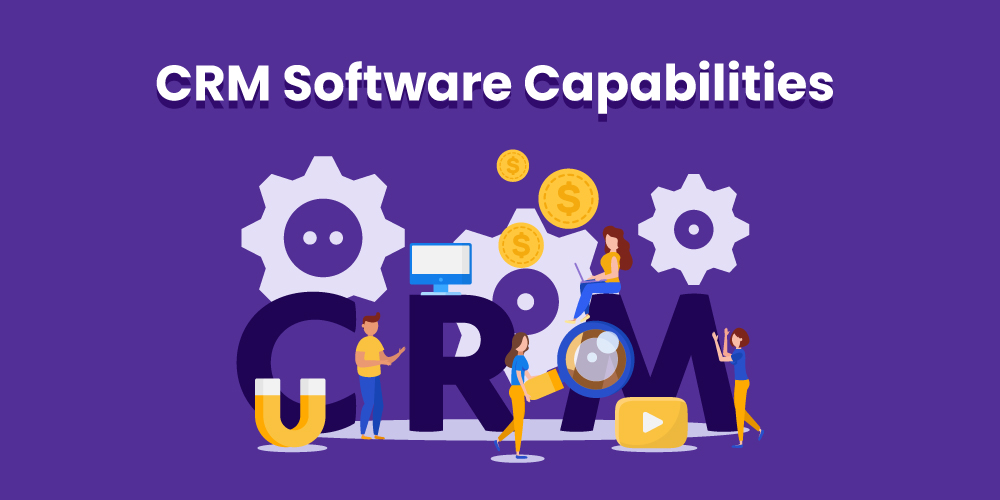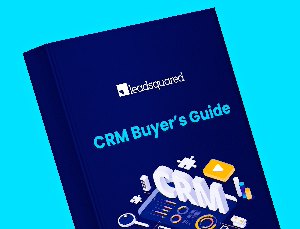Sales and marketing are the backbone of any business. They generate leads and educate your consumers about your product. Any growing company with a strong sales and marketing team can easily win customers.
You may have many touchpoints and channels to interact with your prospects. It is therefore not an easy task to manage all the customers with their unique demands. Now, this is where CRM comes in. CRM tools have helped businesses to maintain their sales efficiency and customer relations.
In this article, we will discuss the capabilities of CRM Software. We will also cover how it makes sales and marketing more efficient.
Benefits and Key Capabilities of CRM Software
CRM software is a smart thing to have for any sales or marketing team. Here are the benefits that you can enjoy with the exclusive capabilities of CRM systems.

1. Improved Communications
With CRM in place, you can provide your customers with high-level services. You will also be able to communicate with your customers in real-time. Some of the real-time communication options of CRM are – chatbots, live chat sessions with sales reps, and phone calls.
Moreover, you can track all these interactions into a centralized system. Thus, in case you change the point of contact with your client, the new employee can look at the activity history and understand the customer better.
2. Better Team Coordination
A team that works as a single unit is more effective. With secure cloud storage and a handy interface, you can always have the information at your disposal. But the information is available only to the collaborators. That is – any unauthorized person cannot access the CRM data.
The data is secure, and at the same time, with the ease of accessibility, sales and marketing teams can work more productively. Along with this, reporting to managers and clients is also easy. This way, CRM allows smooth coordination between teams.
3. Integrations
You might be using some software for some part of your business. For example, sales-intensive organizations use RingCentral for cloud calling.
Now, the traditional process is – the sales reps maintain an excel sheet of their work/call logs. Then they manually enter the notes.
You can simplify this task for your sales reps. By integrating RingCentral with CRM, you can convert phone calls and even voice mails to leads. This way, following up with the leads becomes easy.
So, this is just one example. You can integrate several apps like Gmail, Facebook Ads, Google Ads, and many more with the CRM.
4. Customization
Every business has its unique requirements. Although customers are the center, the interaction patterns are different. For example, the Education sector deals with a particular set of inquiries. Here, the customers are students – who need guidance.
At the same time, the insurance sector has to deal with adults. The leads may not want suggestions but would explore the product benefits.
The point is – a good CRM software adapts according to the business requirements. You can customize them to solve a particular business problem.
5. Improved Client Relationship
MuleSoft study indicates that 72% of global consumers would consider changing service providers because of disconnected experiences. Therefore, sales reps need to know the customers well to keep them satisfied. Better customer relation is the core capability of CRM.
You should be able to show them that you care about them and can take care of them. CRM software will help you form such a relationship with your customers. It has all the solutions already integrated for a quick resolution to any problem.
6. Cost Savings
The CRM software itself has a purchasing rate. But, over time, CRM tools give you a great ROI. The investment is even lesser in SaaS CRM (Software as a Service). Here, you use the software on a monthly/annual subscription basis.
There is another aspect to look at when it comes to cost-saving.
Field sales agents spend a lot of time and money in traveling to meet clients. Imagine if your representatives can plan meetings for a day in a particular region. Your sales reps can then arrange meetings with potential customers in the same area. It will save them traveling time and cost.
7. More Profits
When it comes to productivity, the capabilities of CRM Software are immense.
With CRM, your employees can respond better to all the needs of your customers. It will lead to better customer experience and generate more business for your company. After all, happy customers are the best advocates.
Hence this way, you will be able to generate more revenues and profits for your company.
Things to Consider Before Buying a CRM Software
Now that you know the capabilities of CRM software, it’s time to understand what makes a CRM fit for your business. It will help you select the best CRM software.

1. Accessibility
Accessibility is a crucial factor that you should consider. It corresponds to making your application available and usable to people.
A lot of people work from home these days. Thus, a software that demands the workforce to operate only from their desktops is not good.
Now, this is where cloud-based software and SaaS come into the picture.
Traditionally, enterprises used on-premise CRM systems. But now they are migrating into cloud platforms. It is due to mobility and accessibility reasons.
The next advancement in CRM technology is Mobile CRM. It is a handy mobile app that serves all the necessary benefits of the CRM on your smartphone. Field agents have reported a significant increase in their productivity with Mobile CRMs.
Also read – What is a cloud-based CRM and how does it benefit your business?
2. Compatibility
In general, CRM software can integrate within your existing infrastructure. However, you should check whether the CRM that you have shortlisted is compatible with your existing platform.
Also, you must ensure that it integrates other third-party applications that you use. Otherwise, you might end up with a lot more hassle. What’s the point if the CRM you’re investing in cannot reduce the workload of your team.
3. Cost of Software
The CRM software is mostly customized based on the needs of the company. So, the cost may vary according to the customization that you demand.
There can be a lot of useful features in the CRM system that you have selected. But, if you have specific requirements, you must convey it to your vendor.
The ideal approach to select a CRM would be –
- Assess your needs
- Explore CRM that serves most of your needs
- Ask for customization options and cost for the same
- Reassess the CRM system before making a final decision.
You can also go for SaaS CRM. It is very cost-effective. If in case, it did not work for you, you can switch to other options without any expense. The whole point of SaaS is on-demand availability. Thus, if the cost is a concern, then SaaS CRM is the best for you.
4. Support Options
Businesses have to deal with unforeseen challenges. For instance, the Covid-19 Pandemic changed the office-going culture to work-from-home in a snap. Forget contingency planning organizations faced a tough time continuing their regular operations in a Work-from-home set-up.
At such times, the support you get from your CRM vendor counts a lot. The pandemic was once in a lifetime case, but other challenges might occur during day-to-day operations. Thus, you need to ensure that your service provider has support and customer success teams in place.
5. Friendly Interface
Don’t overlook the UI of the CRM software that you are looking forward to buying.
Senior business people can work with almost every UI. But the users of your CRM would be sales representatives. The interface should be simple enough that your agents need not memorize how to use it. Moreover, your users might be non-technical professionals. They cannot dig into details in case they are unable to use it.
The whole purpose of investing in a CRM is to improve your sales and marketing teams’ efficiency. If they had to hassle with the interface, then instead of saving time, it would become an extra burden to use.
Thus, if you opt for a simple enough system, you can save a lot of time. And this will also encourage your employees to use CRM for all their tasks.
Concluding Remarks
Today, nearly 90% of companies with more than ten employees use a CRM system. It indicates that the CRM system is crucial for businesses.
CRM software is pivotal to improve your business and maintain a good relationship with your customers.
It has many applications ranging from work reporting, automated email response, a reminder system, contact management, sales analytics, communication management, to name some.
I hope these points have helped you understand the capabilities of CRM software. Also, you must now know what additional aspects you should look at while buying a CRM.
LeadSquared is one of the best CRM companies that focuses on the users first.
Related articles:
- What is Cloud CRM and Why You Should Use It?
- What is Call Center CRM?
- What is B2C CRM? How is it different from B2B CRM?
- What is Automotive CRM: The Ultimate Guide
- Benefits of Insurance CRM for Agents
- How Real Estate CRM Can Help Sell Properties Faster?
CRM Software FAQs
The main CRM functions are:
1. Contact management
2. Interaction tracking
3. Workflow automation
4. Lead management
5. Communication and marketing automation
6. Sales team management
7. Reporting and analytics
You can expect to improve sales productivity and customer experience by using a CRM system. It consists of several tools to help you capture, segment, prioritize leads based on a pre-defined set of rules. Details.










